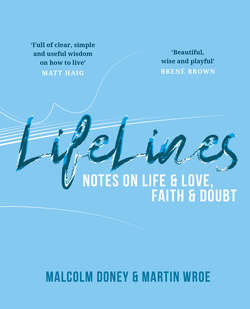Читать книгу LifeLines - Malcolm Doney - Страница 23
На сайте Литреса книга снята с продажи.
Оглавление14
Write down the day
We’re all trying to get a better view of ourselves, but as there’s so much of ourselves to see, perspective can be hard to come by. However, the simple act of setting pen to notepad and keeping a journal can help us step back and bring life into focus.
From the messiest scribble to the most considered and patient entry, a diary helps us stop, reflect and express who we are now. Taking time to write down our lives slows our racing thoughts, and briefly offers us the chance to see them in some kind of order. It enables us to get a feel for the shape of this life we’re in. It helps us, says Joan Didion, ‘remember what it was to be me. That is always the point.’1
In her book The Artist’s Way, written to help people harness their innate creativity, Julia Cameron popularised the notion of producing ‘Morning Pages’ as a path to clear-headedness. Writing three pages, or 750 words, she recommends putting all your thoughts on the page for half an hour – including everything that’s going wrong, the self-doubt, the criticism, the anxiety:
Once we get those muddy, maddening, confusing thoughts on the page, we face our day with clearer eyes. We are more honest with ourselves, more centred, and more spiritually at ease.2
Three pages may prove a luxury. On some mornings we seem to have no time; on others we seem to have nothing to say. But journal entries don’t have to be long, deep or profound. They may be simple sketches or lists: music you’re listening to; films you’ve seen; a novel that touched you. It might be as simple as a note of what someone said to you which you’d like to remember.
Other entries may dive down: asking yourself why a relationship has gone pear-shaped; musing on whether you really could leave your job and change career. Even entries which seem like a dump of inarticulate feelings can, later, glint with moments of clarity.
To distinguish a diary from the week’s routine writing, it can help to write by hand, not on screen, to set aside a book which you don’t use for anything else – and to keep it private. You can be much more honest with yourself if you know no one else is going to read what you write.
A diary may only be cursory, a snapshot. But over time it can become an increasingly reliable witness to your life. As you re-read entries from months or years before, sometimes a journal can become a map of your days, warning you about blind alleys and cul-de-sacs, and, in hilly terrain, encouraging you with a reminder of the view ahead.
Step out of the routine of daily obligations. Step back from the minutiae of each day. Take a look at your life in the round. Record your days. Listen back. See who you are.
